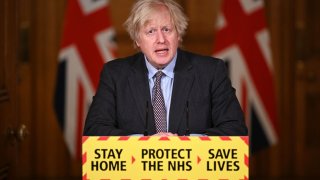
- The lockdown easing for England will "at every stage be dependent on data not dates," U.K. Prime Minister Boris Johnson said Monday evening.
- The first step will see schools in England reopen on March 8.
- The last, planned for June 21, will see the abolishment of all limits on mixing and the reopening of any sectors that remain closed.
- Johnson confirmed that over 17.7 million Britons had received their first dose of a coronavirus vaccine.
LONDON — U.K. Prime Minister Boris Johnson had some good news for the country on Monday after months of lockdown, saying an "unparalleled" vaccination program meant it was "now traveling on a one-way road to freedom."
The lockdown easing for England will come in a number of steps and will "at every stage be dependent on data not dates," he said. The first step will see schools in England reopen on March 8. The last, planned for June 21, will see the abolishment of all limits on mixing and the reopening of any sectors that remain closed, such as nightclubs.
It comes as Johnson confirmed that over 17.7 million Britons had received their first dose of a coronavirus vaccine.
Get New England news, weather forecasts and entertainment stories to your inbox. Sign up for NECN newsletters.
"Nearly a year after this pandemic began, this unparalleled national effort has decisively shifted the odds in our favor," Johnson said in a press conference Monday evening. "We no longer have to rely simply on lockdowns."
He added: "With every day that goes by, this program of vaccinations is creating a shield around the entire population, which means that we are now traveling on a one-way road to freedom and we can begin safely to restart our lives and do it with confidence."
More infectious strain
Money Report
The U.K. has been one of the worst-hit countries by the pandemic, with the fourth-highest number of infections after the U.S., India and Brazil. To date, it has counted over 4.1 million coronavirus cases and has seen 120,987 fatalities as a result of the virus, according to data from Johns Hopkins University.
It saw a sharp rise in cases heading into winter as a new, more infectious strain of the virus emerged in the southeast of the country. It has now become the dominant strain of the virus across the country, and has been detected in numerous countries worldwide, alongside other more virulent strains of the virus.
One silver lining in the U.K.'s experience of the pandemic has been its vaccination response. It was the first country in the world to approve a coronavirus vaccine, the candidate from Pfizer and BioNTech.
It then approved and starting administering the AstraZeneca-University of Oxford jab, a cheaper vaccine that's produced in the U.K. and is easier to transport and store than rival jabs.
Four key tests
Johnson outlined four tests that must be passed before the U.K. can move to the next stage of lifting restrictions. These are:
- That the vaccine deployment program continues successfully.
- Evidence shows vaccines are sufficiently effective in reducing hospitalizations and deaths in those vaccinated.
- Infection rates do not risk a surge in hospitalizations which would put unsustainable pressure on the National Health Service.
- That its assessment of the risks is not fundamentally changed by new coronavirus variants of concern.
Speaking to the nation, Johnson acknowledged that some people would like a more cautious approach to lifting the lockdown, whereas others would prefer the plan was accelerated. He referred to a "careful balance," but stressed that restrictions could not continue indefinitely.
"It's thanks for the rollout of these vaccinations ... that the balance of that judgment is now changing in our favor. And thanks to the vaccinations that there is light ahead leading us to a spring and a summer which I think will be seasons of hope," Johnson said. "From which we will not go back."
New infections falling
Data shows that new infections are falling, with early studies indicating that coronavirus vaccines also help to prevent transmission of the virus, as well as preventing serious disease.
In the last seven days, the U.K. has seen 78,308 new cases of the coronavirus, down 11% from the previous weekly count. The number of deaths in the last seven days, 3,362 fatalities, is also 27% lower than the previous seven-day count. Hospitalizations are also falling.
—CNBC's Holly Ellyatt contributed to this article.






